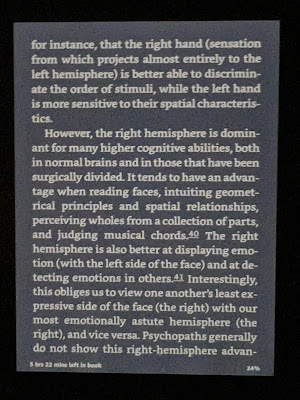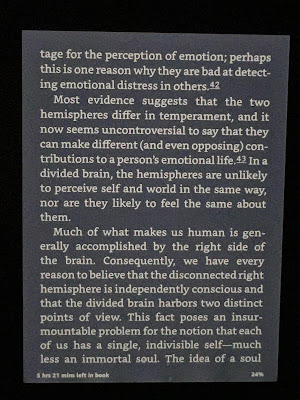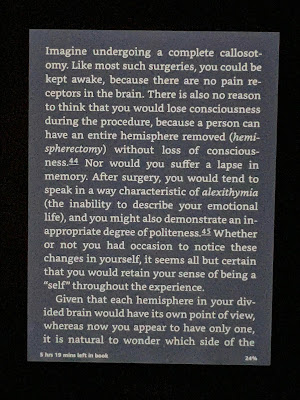She’d secretly been in a downward spiral again. Sadness; depression; grief. The old ”friends”, just coming and going, here and there. Mainly when she was alone.
Apparently she’d been hiding it well enough since her husband exclaimed, “I thought things have been going so well! You seem happy”, when she finally confessed her moods to him. (Telling the truth to her husband as soon as she becomes aware of her negative feelings is her new thing. He just may not know it yet.)
Yes, well. She’s worked on hiding these moods for years, mainly without success, but with work, getting better at it over time (she imagines this is true, anyway). But privately she’d been letting small things set her off again; which were giving rise to discontent; allowing envy to escalate.
She’s risen out of this cycle before (i.e. the work), but until she admits she is even ‘there’, she won’t take the steps to course correct. Plus she didn’t want to have to admit anything was wrong! She’s happy! She’s good! She’s accepted! She’s surrendered!
ON DISCONTENT
But then there’s the biggest small thing. The gagging. The coughing/sneezing. And finally, the exclamation point…PUKING. Austin’s attempt to manage his secretions has been the biggest thorn in HER side since his birth. Out of all the things his body does and doesn’t do according to the “compatible-with-life” manual, this is the one thing that really, REALLY goads her.
The ONE thing.
The one thing she’s asked God for. Begged for. Pleaded for. Raged for. The one thing that seems to hold her family back the most when trying to live their lives like regular people.
The puke-possibility always has her on edge. Whether she can be diagnosed with PTSD or not, she can certainly identify with something like that. The potential puking has to be planned for, antipated, and expected. And if he’s sitting up for too long, it’s almost a g*d d*mn guarantee.
This is why (in case you’ve ever noticed) she doesn’t take him on very many outings besides doctors, school, and rarely more now, church. She cannot emotionally tolerate people staring at them, judging them, or pitying them.
Other people don’t know the circumstances of why, out of the blue, he just starts gagging, coughing, scream-sneezing, and puking all over himself, herself, his wheelchair, and most likely the floor next to their family trying to have a nice sit-down dinner.
So she decided long ago, she’s not putting herself in the position of apologizing and trying to make people feel comfortable anymore.
She’s tired.
Do you here that universe?! SHE’S TIRED!
She’s tired of explaining. She’s tired of trying to hide her true feelings during his dramatic/traumatic attempts to breathe. And she’s tired of pretending to stay calm and pleasant for all the onlookers when inside she just wants scream, flail, and throw a two-year old’s fit.
She’s just as grossed out and dismayed as everyone else. She, too, finds it disgusting. But instead of reacting how she feels inside, she has to stay calm for Austin, as well as assure everyone around them that it’s ok, it’s normal, it’s just his condition, blah, blah, blah. And she’s even smile while doing it! Ugh.
ON ENVY
So when she hears about families, your family, jumping into the car for a fun outing together across town for the day, or taking a trip to somewhere new that maybe involves an airplane, or even the mundane “put the kids in the car” and go to the grocery store, she’s envious of your freedom; and then she’s discontented
with her ‘chains’.
Cue negative-feeling spiral. Hello darkness, my old friend….
ON AWARENESS
But now! Now she’s aware and has admitted there’s a problem! Which means now she needs to do the work. Back to the basics. Rediscover her salvation.
Looking back to the first time she climbed out of this hole, she feels like she was rescued from despair through three authors. It was a progression of revelation. Each building on the next.
She had first turned to CS Lewis: Mere Christianity, The Great Divorce, Surprised By Joy, A Grief Observed, and finally The Problem of Pain.
Of course she was looking to find her hope in Christianity. It was her upbringing, her lens through which all things are filtered. So she figured she’d find answers from an author who is touted as the religion’s greatest apologist. She listened to several of his books, checked out through her library app, a few several times, trying to grasp the truth he seemed so confident in. She found she resonated most with The Problem Of Pain.
Hiking at this time in her life while Austin was in school became her meditation and also something to do while listening to her books. So you know how you remember explicit details of where you were and what you were doing when a shift happens in your world?
Well it was after hiking the North Mountain Trail in Phoenix, and while sticky and sweaty, sitting on a cold concrete bench in the shade of a picnic shelter at the North Mountain Park that her aunt, on the phone, asked her if she’d ever heard of Eckart Tolle.
She had not. But within days she had downloaded and listened to The Power of Now, plus any other digital recordings of his she could find and checkout through the library. That’s when she came across A New Earth, and later, his synopsis Stillness Speaks.
Her shift in perspective had begun at this point. She felt she was finally being given practical tools she could apply to help herself out of her funk.
After her emersion into everything Tolle, this was about the time her son mentioned something about Jordan B. Peterson. And as a mom who loves to read what her kids are reading hoping to get insights into their innermost psyche, she downloaded 12 Rules For Life. It was good stuff. Wake you out of your trance that life should be easy kind of stuff.
So after listening to the audio book, she searched out more if his work which led her to his podcasts, and specifically his 15-Part Lecture series on The Psychological Significance of the Biblical Stories. She found herself resonating so much to these lectures, that she’d notice she was audibly “mmm hmm-ing” and “yes-ing” and smiling along with his observations and presentation of Biblical stories she had grown numb to. It felt miraculous.
She was finally feeling alive again! Hopeful! She had so many tools and new perspectives at the touch of a play button, and now these perspectives were being added to her mind, and hopefully, creeping into her being where it might someday become a part of her! She felt so good.
ON THE BIBLE
But why not just turn to the Bible straight out of the box, you ask?
Well, she grew up with it. The words from memorization were ingrained in her. But having heard the words, their rhythm, so much, she just couldn’t hear the essence of its truth anymore. She’d get caught up in the minutia of the stories, weighing “truth” against whether or not they were literally true so much that she couldn’t hear or perceive the big picture and actual “truth” anymore.
Lewis, Tolle, and Peterson gave her back this big picture through fresh lenses.
Lewis taught her life is hard for everyone. Just experiences differ. And it’s OK to question God.
Tolle taught her life is hard, but there’s an essence of being/awareness within us that can accept and surrender to life circumstances and essentially end the perceived suffering in the moment, and with practice, perhaps ongoing and forever.
Peterson taught her life is hard, we have to accept that, but hope and joy can be found in the pursuit of the highest good/what people might refer to as God . One conscious choice/one little step at a time.
So the big picture for her is there will ALWAYS be hardship, pain and suffering. But that’s ok when we learn how to put it in perspective. It does not have to be experienced as suffering. It’s our emotions and the body’s physical reaction to thoughts that seem to determine whether what we experience is labeled good or bad. If we can just observe the emotions and thoughts and not identify with them, the experience can dissipate into a neutral label.
Similar to how often just getting perspective based on time passing and distance from a hard experience allows many people to change their label of that experience. Looking back at something hard that you went through and survived often gives rise to a feeling of accomplishment and satisfaction rather than despair and grief even though at the the time, you thought you’d never survive and endure it. We are usually stronger than we think we will be.
So it’s our emotional and physical reactions that determine whether we cower or overcome; rage or rejoice; become the villain or the hero.
And she so wants to be the HERO of her story.
So she’s returning to her basics. (Maybe not for the last time.) But she’s confident that the found truths that brought her back to life in the past will rescue her once again. God willing.








.jpeg)



















